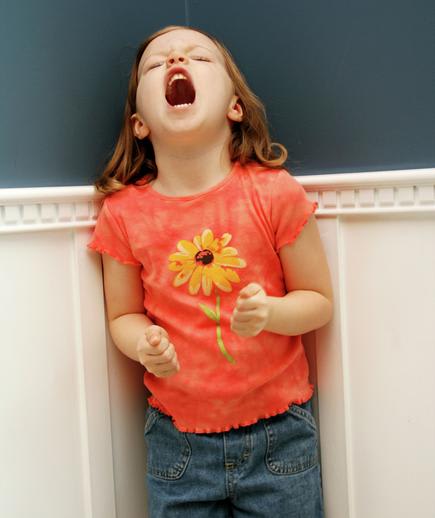After a lengthy argument that had no beginning and seemingly no end, a five year old grandson angrily pushed his four year old brother off a chair. The chair fell over and broke; the four year tumbled over too, banging his head on the floor and emitting a scream loud enough to wake the dead.
My patience hit rock bottom. I took the hand of Mr. Five and gave it one smart slap. “We do not hit!” I decreed (after delivering my slap). “Nor do we hit people smaller than we are!” (Hmm…. who was bigger – him or me?) He was so surprised that he forgot to cry. “You hit me!” he said.
“Yes indeedy, I did. And if you hit Meir again, I’ll hit you again too!
As he was absorbing this weighty lesson, his mother entered the room and took in the scene.
“Imma,” she said firmly, “we do not slap our kids.”
“He’s not my kid,” I replied just as firmly as she. “He’s yours. And this was a willful act, perpetrated with malice and anger.”
“You’re angry too!” she said.
You bet I was, but I chose to define my actions differently. “A well placed, one-in-a-while, loving slap won’t hurt him,” I responded. “It’s educational.”
“Moish and I do not slap our children,” she repeated. “We talk to them.”
Yes they do. They talk and explain and talk some more. They wear them down with such lengthy speeches that the kids learn early on that it’s easier to behave than to listen. I agree that there is merit in this approach, but parents are human too, and sometimes things get out of hand. Even Shlomo Hamelech, unable to untangle a child’s version of who did what first, when, how and to whom, must have delivered a well placed slap now and then.
“Sometimes one slap is worth a thousand words,” I said.
“Then speak the thousand words,” she said. “We do not slap.”
I sighed. Our children are all truly wonderful, loving, intelligent, dedicated, wise parents. All Jewish children should have such parents. And they love, honor and respect their own parents as well. But for some reason, they seem to feel that they will raise their own children more successfully than they themselves were raised.
“Your generation believed in slapping. We don’t,” she explained patiently.
I was deeply insulted. Did I raise a brood of battered kids? Did a few scattered childhood slaps leave such deep scars on their psyche? Didn’t she know about sparing the rod and spoiling the child?
“Did we do you any damage?” I asked petulantly. “Is something wrong with you, or your sisters or brothers?” I insisted.
“Not at all. you and Abba did a wonderful job raising us, but that doesn’t mean you were perfect. We’re trying for more.”
Well, good luck I thought.
She smiled again and gave me a kiss. “Imma, you were wonderful parents, really you were. But you raised yours. Now let us raise ours. B’ezras Hashem, we’ll do a good job too, just like you did.” The conversation ended just as fresh fighting ensued between the two brothers. I left her to talk it away.
I believe each generation should be allowed to raise its own children, but will all of my hard earned wisdom and experience vanish like the winds of yesteryear? Years of solving problems, making peace between warring parties, performing parental miracles while educating, civilizing, turning uncouth, difficult, noisy little creatures into beautiful human beings – would it all go to waste, never to be used again? Did we have only one chance – which was mostly trial and error? But now that I had it all down pat and finally knew the right way to do the job, was there no one out there willing to listen? It was hard to accept this decree.
Fortunately I didn’t have to. Over time, I discovered that other young parents (not my own children, of course, but their friends) thought my hard earned wisdom was valuable and worth listening to. They would stop by to say hello and stay to discuss various domestic and child rearing issues. When I mentioned this to my own offspring, the reaction was, “Of course your wisdom and advice are invaluable. We always said you and Abba did a superb job with us, didn’t we?”
Nonetheless, they prefer their own opinions which they are wiling to share freely.
“Imma, you finished being a mother. Now be a bubby.” And what are Bubbys supposed to do, I ask.
“They are there to love their grandchildren unconditionally, at all times, in all places, and under all circumstances. Just tell them how wonderful they are, even when they aren’t. Leave the molding, educating and knocking into shape to us.”
Do you know what? They are absolutely right. Their wise advice removed a great weight from my sagging shoulders. Now, when the grandkids act up, it’s no longer my problem. I just sigh and try to look sad. It’s usually very effective.
So in the end, I agree with my kids. We must have done a great job raising them if they turned into such wise parents!
Yaffa Ganz is the award winning author of more than forty Jewish juvenile titles including Sand and Stars – a 2000 year saga of Jewish history for teen readers. Her latest book – “A Different Dimension” published by Hamodia Publishers – is an anthology of essays on contemporary Jewish life.
The words of this author reflect his/her own opinions and do not necessarily represent the official position of the Orthodox Union.



